-
 Bitcoin
Bitcoin $83,438.1766
0.92% -
 Ethereum
Ethereum $1,803.5224
0.96% -
 Tether USDt
Tether USDt $0.9998
0.03% -
 XRP
XRP $2.1693
5.40% -
 BNB
BNB $596.4287
1.39% -
 Solana
Solana $119.8047
3.86% -
 USDC
USDC $1.0001
0.01% -
 Dogecoin
Dogecoin $0.1702
4.03% -
 Cardano
Cardano $0.6607
3.91% -
 TRON
TRON $0.2365
-0.86% -
 Chainlink
Chainlink $12.8962
2.78% -
 UNUS SED LEO
UNUS SED LEO $8.9457
-4.61% -
 Toncoin
Toncoin $3.2914
-2.80% -
 Stellar
Stellar $0.2574
0.48% -
 Avalanche
Avalanche $18.2528
1.50% -
 Sui
Sui $2.2547
3.44% -
 Shiba Inu
Shiba Inu $0.0...01228
1.52% -
 Hedera
Hedera $0.1620
1.28% -
 Litecoin
Litecoin $83.1893
0.92% -
 Polkadot
Polkadot $3.9691
-1.51% -
 MANTRA
MANTRA $6.2531
-0.59% -
 Bitcoin Cash
Bitcoin Cash $302.8680
1.47% -
 Bitget Token
Bitget Token $4.5061
0.37% -
 Dai
Dai $1.0002
0.02% -
 Ethena USDe
Ethena USDe $0.9991
-0.04% -
 Pi
Pi $0.6709
29.03% -
 Monero
Monero $216.8851
0.73% -
 Hyperliquid
Hyperliquid $11.8914
6.11% -
 Uniswap
Uniswap $5.8813
1.97% -
 OKB
OKB $51.4130
8.48%
How is the exchange rate of the Exodus wallet calculated?
Exodus wallet calculates exchange rates using real-time data from multiple exchanges and proprietary algorithms, ensuring accuracy and reflecting current market conditions.
Apr 04, 2025 at 07:00 am
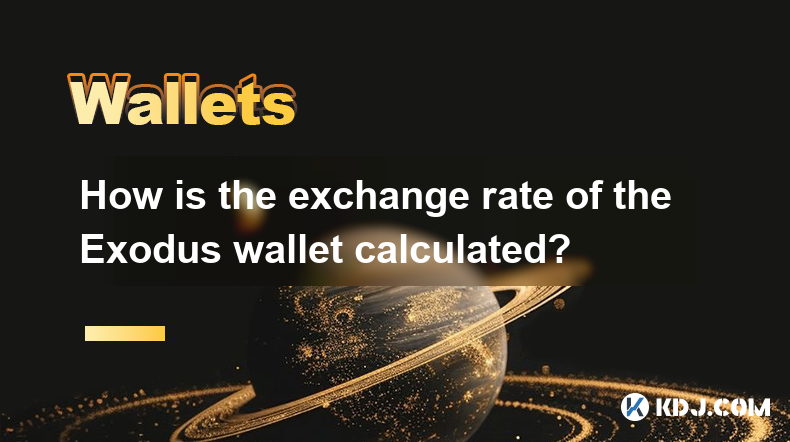
The exchange rate of the Exodus wallet is calculated through a combination of real-time data from various cryptocurrency exchanges and proprietary algorithms to provide users with accurate and up-to-date conversion rates. When a user wishes to convert one cryptocurrency to another within the Exodus wallet, the wallet fetches the latest market data from multiple sources to determine the best possible rate. This process ensures that users get a fair exchange rate that reflects the current market conditions. Additionally, Exodus takes into account factors such as liquidity, trading volume, and market volatility to refine the rates further.
Real-Time Data Collection
Exodus wallet uses a sophisticated system to collect real-time data from various cryptocurrency exchanges. This data is crucial for calculating the exchange rate accurately. The wallet connects to multiple APIs provided by exchanges like Binance, Coinbase, and Kraken, among others. By aggregating data from these sources, Exodus ensures that it has a comprehensive view of the market. The data collected includes the current trading prices, order book information, and trading volumes for each cryptocurrency pair. This multi-source approach helps in mitigating the risk of relying on a single exchange's data, which might be subject to manipulation or technical issues.
Proprietary Algorithms
Once the real-time data is collected, Exodus employs proprietary algorithms to process this information and calculate the exchange rate. These algorithms are designed to analyze the data and determine the most accurate and fair rate for users. The algorithms consider various factors such as the bid-ask spread, market depth, and historical price movements. By doing so, they can provide a rate that not only reflects the current market conditions but also accounts for potential future movements. This ensures that users get a rate that is both competitive and reliable.
Market Liquidity and Volatility
Market liquidity and volatility play significant roles in determining the exchange rate within the Exodus wallet. Liquidity refers to the ease with which a cryptocurrency can be bought or sold without affecting its market price. Higher liquidity generally results in more stable and reliable exchange rates. Volatility, on the other hand, measures the rate of price changes over time. High volatility can lead to significant fluctuations in exchange rates, making it challenging to provide accurate rates. Exodus's algorithms take these factors into account to adjust the exchange rate accordingly, ensuring that users get the best possible rate under current market conditions.
User Experience and Rate Optimization
Exodus wallet aims to provide a seamless user experience by optimizing the exchange rate calculation process. The wallet's interface is designed to be user-friendly, allowing users to easily convert between different cryptocurrencies. When a user initiates a conversion, the wallet quickly calculates the exchange rate and displays it to the user. This process is optimized to minimize delays and ensure that users receive the most up-to-date rate. Additionally, Exodus continuously updates its algorithms and data sources to improve the accuracy and reliability of the exchange rates, enhancing the overall user experience.
Security and Transparency
Security and transparency are paramount in the calculation of exchange rates within the Exodus wallet. The wallet employs robust security measures to protect user data and ensure that the exchange rate calculations are not tampered with. All data collected from exchanges is encrypted and securely stored, and the algorithms used for rate calculation are regularly audited to ensure their integrity. Additionally, Exodus provides transparency by allowing users to view the sources of the data used for rate calculation. This transparency helps build trust with users, as they can see that the rates are based on real market data and not manipulated internally.
Impact of Trading Volume
Trading volume is another critical factor that influences the exchange rate calculation in the Exodus wallet. High trading volumes generally indicate a more active market, which can lead to more stable and reliable exchange rates. When calculating the exchange rate, Exodus takes into account the trading volumes of the cryptocurrencies involved in the conversion. Higher volumes can result in tighter bid-ask spreads, which in turn can lead to better exchange rates for users. By considering trading volume, Exodus ensures that the rates provided are reflective of the market's overall activity and liquidity.
Handling Market Fluctuations
Market fluctuations are a constant challenge in the cryptocurrency space, and Exodus wallet has developed strategies to handle these fluctuations effectively. When the market experiences sudden changes, the wallet's algorithms quickly adjust the exchange rates to reflect these new conditions. This rapid adjustment helps ensure that users are not adversely affected by sudden price movements. Additionally, Exodus uses historical data and predictive models to anticipate potential market movements and adjust the rates accordingly. This proactive approach helps in providing users with stable and reliable exchange rates even during periods of high volatility.
Integration with Multiple Exchanges
Exodus wallet's integration with multiple cryptocurrency exchanges is a key component of its exchange rate calculation process. By connecting to a diverse range of exchanges, Exodus can gather a more comprehensive set of data, which leads to more accurate and reliable exchange rates. Each exchange provides its own set of data, including trading prices, order book information, and trading volumes. By aggregating this data, Exodus can calculate an average rate that is more representative of the overall market. This multi-exchange approach also helps in reducing the impact of any single exchange's technical issues or data anomalies on the calculated rates.
User Control and Customization
Exodus wallet offers users a degree of control and customization over the exchange rate calculation process. Users can choose which exchanges they want the wallet to use for data collection, allowing them to tailor the rate calculation to their preferences. Additionally, users can set custom thresholds for rate updates, ensuring that they are always working with the most current data. This level of control empowers users to make informed decisions about their cryptocurrency conversions and ensures that they are comfortable with the rates provided by the wallet.
Continuous Improvement and Updates
Exodus wallet is committed to continuous improvement and regularly updates its exchange rate calculation algorithms and data sources. These updates are designed to enhance the accuracy and reliability of the rates provided to users. The wallet's development team closely monitors market trends and user feedback to identify areas for improvement. By staying up-to-date with the latest developments in the cryptocurrency space, Exodus can ensure that its exchange rate calculation process remains at the forefront of the industry. This commitment to continuous improvement helps in providing users with the best possible exchange rates and a superior overall experience.
Common Questions
Q: How does Exodus wallet ensure the accuracy of its exchange rates?
A: Exodus wallet ensures the accuracy of its exchange rates by collecting real-time data from multiple cryptocurrency exchanges and using proprietary algorithms to process this data. The wallet considers factors such as market liquidity, volatility, and trading volume to provide the most accurate and up-to-date rates.
Q: Can users customize the exchange rate calculation in Exodus wallet?
A: Yes, users can customize the exchange rate calculation in Exodus wallet. They can choose which exchanges to use for data collection and set custom thresholds for rate updates, allowing them to tailor the process to their preferences.
Q: How does Exodus wallet handle market fluctuations?
A: Exodus wallet handles market fluctuations by quickly adjusting its exchange rates to reflect new market conditions. The wallet uses historical data and predictive models to anticipate potential market movements and adjust the rates accordingly, ensuring stability and reliability.
Q: What role does trading volume play in Exodus wallet's exchange rate calculation?
A: Trading volume plays a significant role in Exodus wallet's exchange rate calculation. Higher trading volumes indicate a more active market, which can lead to more stable and reliable exchange rates. Exodus takes trading volumes into account to provide rates that reflect the market's overall activity and liquidity.
Q: How does Exodus wallet ensure the security and transparency of its exchange rate calculations?
A: Exodus wallet ensures the security and transparency of its exchange rate calculations through robust security measures and regular audits of its algorithms. The wallet encrypts and securely stores all data collected from exchanges and provides transparency by allowing users to view the sources of the data used for rate calculation.
Disclaimer:info@kdj.com
The information provided is not trading advice. kdj.com does not assume any responsibility for any investments made based on the information provided in this article. Cryptocurrencies are highly volatile and it is highly recommended that you invest with caution after thorough research!
If you believe that the content used on this website infringes your copyright, please contact us immediately (info@kdj.com) and we will delete it promptly.
- title: GameStop Completes $1.5B Fundraising Round to Invest in Bitcoin
- 2025-04-05 20:20:13
- South Korea's 7-Eleven stores will accept payments in the country's central bank digital currency (CBDC)
- 2025-04-05 20:20:13
- VanEck Proposes First BNB ETF in the U.S.
- 2025-04-05 20:15:12
- South Korean company launches 'political meme coins' to gauge public sentiment during impeachment trial
- 2025-04-05 20:15:12
- Despite Market Slowdown, DeFi Lending Continues to Be One of the Most Active App Types
- 2025-04-05 20:10:12
- The XRPTurbo presale has officially sold out, securing over 300000 XRP in under 30 days
- 2025-04-05 20:10:12
Related knowledge
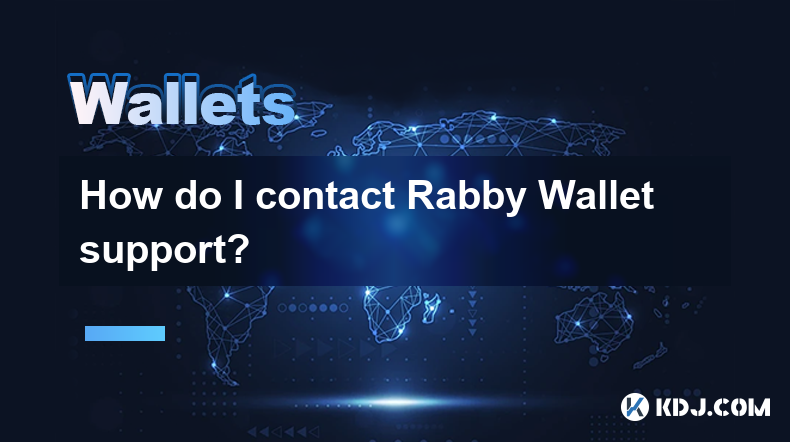
How do I contact Rabby Wallet support?
Apr 04,2025 at 08:42am
Introduction to Rabby Wallet SupportIf you are a user of Rabby Wallet and need assistance, knowing how to contact their support team is crucial. Rabby Wallet offers various methods to reach out for help, ensuring that users can get the support they need efficiently. This article will guide you through the different ways to contact Rabby Wallet support, ...
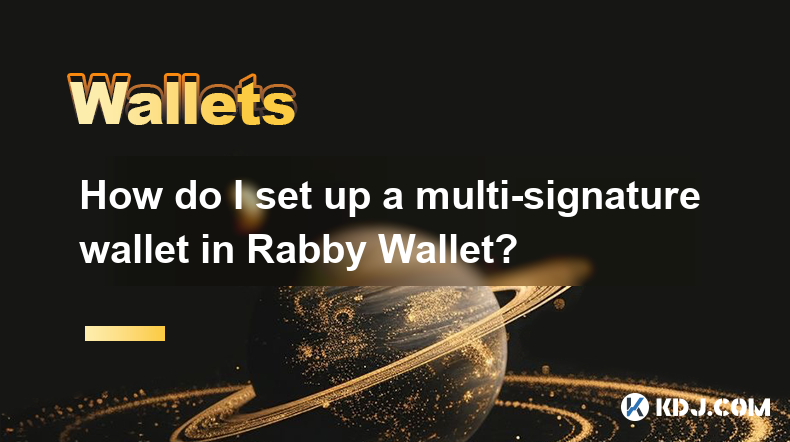
How do I set up a multi-signature wallet in Rabby Wallet?
Apr 05,2025 at 06:49pm
Setting up a multi-signature wallet in Rabby Wallet involves several detailed steps to ensure security and functionality. A multi-signature wallet requires multiple private keys to authorize a transaction, adding an extra layer of security. Here's a comprehensive guide on how to set up a multi-signature wallet in Rabby Wallet. Understanding Multi-Signat...
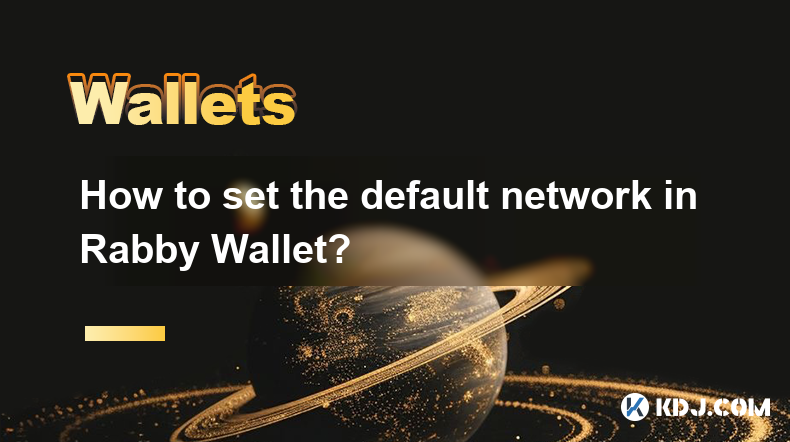
How to set the default network in Rabby Wallet?
Apr 04,2025 at 06:35am
Setting the default network in Rabby Wallet is a crucial step for users who frequently interact with different blockchain networks. This guide will walk you through the process of setting your preferred network as the default, ensuring a seamless experience when managing your cryptocurrencies. Whether you're using Ethereum, Binance Smart Chain, or any o...
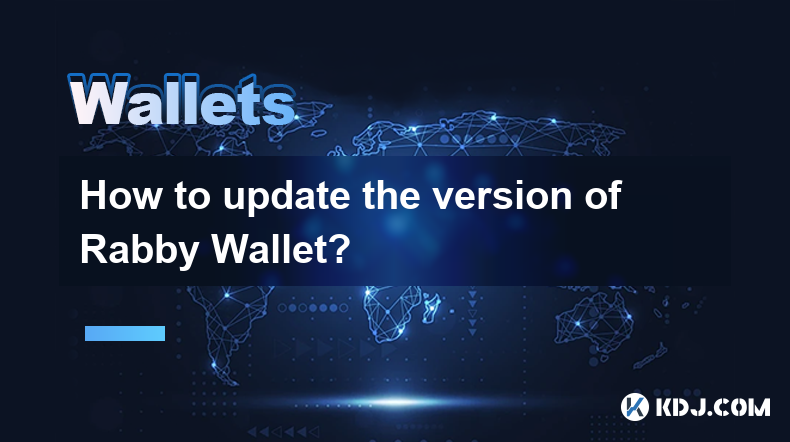
How to update the version of Rabby Wallet?
Apr 05,2025 at 02:14am
Updating the version of Rabby Wallet is an essential task to ensure you have the latest features, security enhancements, and bug fixes. This guide will walk you through the process of updating Rabby Wallet on different platforms, including desktop and mobile devices. Let's dive into the detailed steps for each platform. Updating Rabby Wallet on DesktopU...
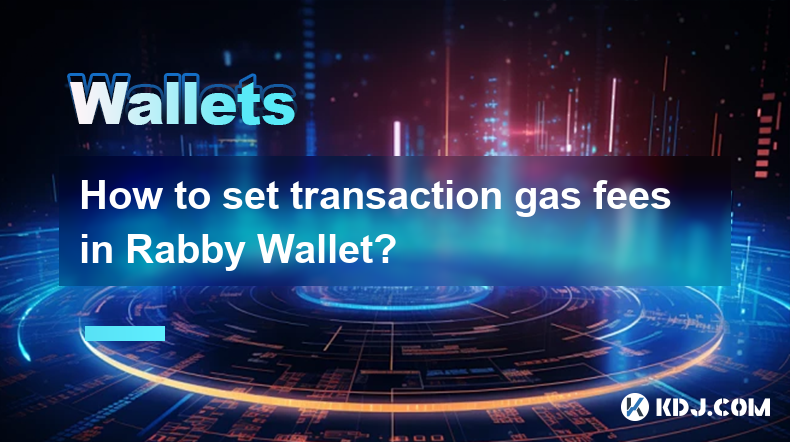
How to set transaction gas fees in Rabby Wallet?
Apr 05,2025 at 02:29pm
How to set transaction gas fees in Rabby Wallet?Rabby Wallet is a versatile tool for managing cryptocurrency transactions, offering users the flexibility to customize gas fees according to their preferences. Setting the right transaction gas fees is crucial for ensuring your transactions are processed efficiently and economically. This guide will walk y...
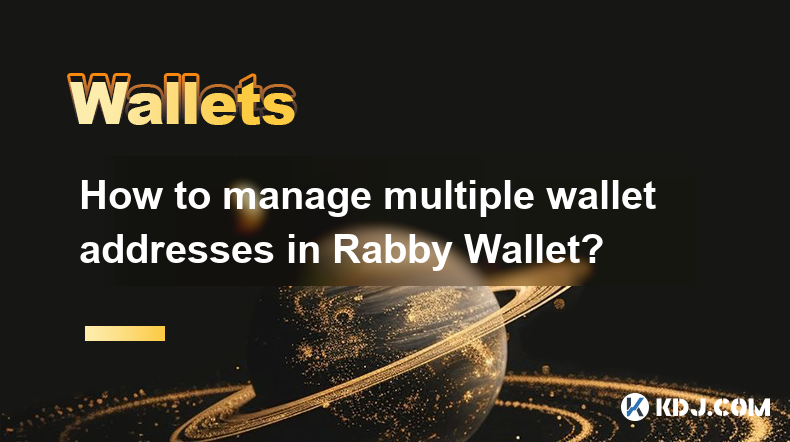
How to manage multiple wallet addresses in Rabby Wallet?
Apr 05,2025 at 07:14am
Managing multiple wallet addresses in Rabby Wallet can significantly enhance your cryptocurrency management experience. Whether you're a seasoned crypto enthusiast or a beginner, understanding how to efficiently handle multiple addresses can streamline your transactions and improve your security. In this article, we will explore the detailed steps and b...

How do I contact Rabby Wallet support?
Apr 04,2025 at 08:42am
Introduction to Rabby Wallet SupportIf you are a user of Rabby Wallet and need assistance, knowing how to contact their support team is crucial. Rabby Wallet offers various methods to reach out for help, ensuring that users can get the support they need efficiently. This article will guide you through the different ways to contact Rabby Wallet support, ...

How do I set up a multi-signature wallet in Rabby Wallet?
Apr 05,2025 at 06:49pm
Setting up a multi-signature wallet in Rabby Wallet involves several detailed steps to ensure security and functionality. A multi-signature wallet requires multiple private keys to authorize a transaction, adding an extra layer of security. Here's a comprehensive guide on how to set up a multi-signature wallet in Rabby Wallet. Understanding Multi-Signat...

How to set the default network in Rabby Wallet?
Apr 04,2025 at 06:35am
Setting the default network in Rabby Wallet is a crucial step for users who frequently interact with different blockchain networks. This guide will walk you through the process of setting your preferred network as the default, ensuring a seamless experience when managing your cryptocurrencies. Whether you're using Ethereum, Binance Smart Chain, or any o...

How to update the version of Rabby Wallet?
Apr 05,2025 at 02:14am
Updating the version of Rabby Wallet is an essential task to ensure you have the latest features, security enhancements, and bug fixes. This guide will walk you through the process of updating Rabby Wallet on different platforms, including desktop and mobile devices. Let's dive into the detailed steps for each platform. Updating Rabby Wallet on DesktopU...

How to set transaction gas fees in Rabby Wallet?
Apr 05,2025 at 02:29pm
How to set transaction gas fees in Rabby Wallet?Rabby Wallet is a versatile tool for managing cryptocurrency transactions, offering users the flexibility to customize gas fees according to their preferences. Setting the right transaction gas fees is crucial for ensuring your transactions are processed efficiently and economically. This guide will walk y...

How to manage multiple wallet addresses in Rabby Wallet?
Apr 05,2025 at 07:14am
Managing multiple wallet addresses in Rabby Wallet can significantly enhance your cryptocurrency management experience. Whether you're a seasoned crypto enthusiast or a beginner, understanding how to efficiently handle multiple addresses can streamline your transactions and improve your security. In this article, we will explore the detailed steps and b...
See all articles



















































































